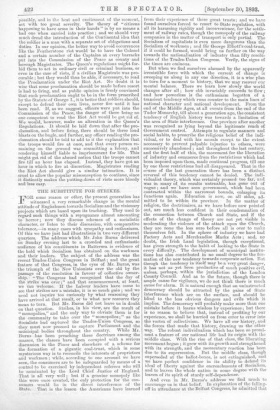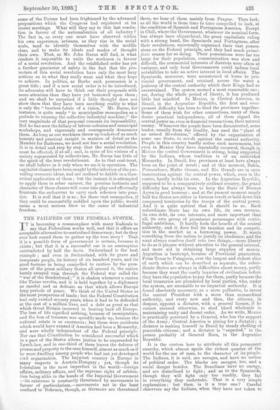THE SUBSTITUTE FOR STRIKES.
FOR. some reason or other, the present generation has witnessed a very remarkable change in the mental attitude of Englishmen towards Socialism and the visionary projects which are based upon its teaching. They used to regard such things with a repugnance almost amounting to horror ; now they discuss schemes of a socialistic character, or listen to their discussion, with comparative tolerance,—in many cases with sympathy and enthusiasm. Of this we have just had illustrations in two very different quarters. The address which Mr. John Burns delivered on Sunday evening last to a crowded and enthusiastic audience of his constituents in Battersea, is evidence of the hold which Socialism has obtained on the workmen and their leaders. The subject of the address was the recent Trades-Union Congress in Belfast ; and the great feature of that Congress, in the eyes of Mr. Burns, was the triumph of the New Unionists over the old by the passage of the resolution in favour of collective owner- ship. The Congress had recognieed that the day of the strike was over ;" and that announcement, at least, we can welcome. If the Labour leaders have come to see that strikes are a mistake, it is so much gain ; and we need not inquire too curiously by what reasoning they have arrived at that result, or to what new resource they mean to turn, But Mr. Burns did not leave us in doubt on that question. Strikes, in his view, are the result of "monopolies," and the only way to obviate them is for the community to take over the " monopolies ; " as the Socialists had captured the Trades-Union Congress, so they must now proceed to capture Parliament and the municipal bodies throughout the country. While Mr. Burns has been preaching these doctrines among the masses, the classes have been occupied with a serious 'discussion in the Times and elsewhere of a scheme for the formation of a gigantic coal-trust, which in some mysterious way is to reconcile the interests of proprietors and workmen ; while, according to one account we have seen, the consumers are to be safeguarded by means of a control to be exercised by independent referees who will be nominated by the Lord Chief Justice of England. That is all very well ; but if a genuine monopoly like this were once created, the only protection' for the con- sumers would lie in the direct interference of the State. That is the lesson the Americans have learned from their experience of these great trusts ; and we have found ourselves forced to resort to State regulation, with all its harassing rigidity and inconvenience, for the settle- ment of railway rates, though the monopoly of the railway companies in the matter of transport is only partial. The Socialism of capitalists is even more dangerous than the Socialism of workmen ; and Sir George Elliott's coal-trust, if it could be formed, would bring us further on the way towards the nationalisation of industry than fifty resolu- tions of the Trades-Union Congress. Verily, the signs of the times are ominous.
But when we find ourselves alarmed by the apparently irresistible force with which the current of change is sweeping us along in any one direction, it is a wise plan to turn for a moment to history, that we may recover our mental balance. There we learn how slowly the world changes after all ; how ebb invariably succeeds to flow ; and how powerless is the enthusiasm begotten of a transient tendency which runs counter to the main lines of national character and national development, From the end of the Middle Ages, at all events from the end of the Tudor Monarchy, till about a generation ago, the consistent tendency of English history was towards a limitation of the area of State interference. One province after another was recognised as lying beyond the legitimate reach of Government control. Attempts to regulate manners and. social habits, to prescribe the religious belief of the indi- vidual, or to deal with his morals except to the extent necessary to prevent palpable injustice to others, were successively abandoned ; and throughout the last century, and the first half of this, the movement for the liberation of industry and commerce from the restrictions which had been imposed upon them, made continual progress, till one by one these restrictions had all disappeared. That in the course of the last generation there has been a distinct reversal of this tendency cannot be denied. The indi- vidualist theory, which was certainly pressed too far, and was in many of its results untenable, has gone out of vogue ; and we have seen government, which had been contracted within the narrowest bounds, enlarging its functions again. Education is now, on all sides, ad- mitted to be within its province. In the matter of religion, the doctrinaires, as we have before now pointed out, are much less confident in their condemnation of the connection between Church and State, and if the effects of the change of theory are not yet visible in moderating the violence of the attack upon the Church, they are none the less sure before all is over to make themselves felt. In the sphere of industry we have had Factory Acts and Merchandise Marks Acts ; and, no doubt, the Irish Land legislation, though exceptional, has given strength to the habit of looking to the State in every difficulty. The development of municipal institu- tions has also contributed in no small degree to the for- mation of the new tendency towards corporate action. But though the tendency in itself may be a very great danger, it has not as yet been productive of much positive evil, unless, perhaps, within the jurisdiction of the London County Council. And as to the future, though there is ample cause for vigilance, we do not think there is much cause for alarm. It is natural enough that an uninstructed democracy should be attracted by the gains of State interference which are on the surface, and should be blind to the less obvious dangers and evils which it implies. The democracy will probably make more than one mistake before it learns wisdom by experience; but there is no reason to believe that, instead of profiting by our experience, we shall be hurried on from error to error into the vortex of collectivism. We have all our history, and the forces that made that history, drawing us the other way. The robust individualism which has been so promi- nent a feature of our national life had its origin with the middle class. With the rise of that class, the liberating movement began ; it grew with its growth and Aron gthened with its strength, and the momentary reaction has been due to its supersession. But the middle class, though superseded at the ballot-boxes, is not extinguished, and we have perfect confidence in its ability to defend its ideal of liberty against the encroachments of Socialism, and to leaven the whole nation in some degree with the leaven of its spirit of sturdy self-dependence. And even in Mr. Burns's address we find much to encourage us in that belief. In explanation of the falling- off in attendance at the Belfast Congress, he admitted that some of the Unions had been frightened by the advanced propositions which the Congress had registered at its recent meetings. What will they say to this last resolu- tion in favour of the nationalisation of all industry ? The fact is, as every one must have observed within his own experience, artisans, as they rise in the social scale, tend to identify themselves with the middle class, and to make its ideals and modes of thought their own. That, as Mr. John Burns will find, is what renders it impossible to unite the workmen in favour of a social revolution. And the established order has yet a further guarantee of safety in the fact that the pro- moters of this social revolution have only the most hazy notions as to what they really want and what they hope to achieve. In politics, as Burke said, possession is a great title ; and. if a new social order is to be introduced, its advocates will have to think out their proposals with more attention than they have yet bestowed upon them ; and we shall be surprised if a little thought does not show them that they have been ascribing reality to what is only the "baseless fabric of a vision." Mr. Burns, for instance, is quite ready "to municipalise monopolies as a prelude to running the collective industrial machine ;" the very magnitude of that proposal conceals its impossibility. But he has seen the fallacy of labour-colonies and municipal workshops, and vigorously and courageously denounces them. As long as our workmen throw up leaders of as much honesty and practical insight in matters of detail as the Member for Battersea, we need not fear a social revolution. It is in detail and step by step that the social revolution must be effected, if at ; and, in spite of his visions of a society regenerated by collectivism, Mr. Burns has little of the spirit of the true revolutionist. As to that coal-trust, we shall believe in it only when we see it in operation. The capitalist classes have been caught by the infection of the pre- vailing economic ideas, and are inclined to dabble in a theo- retical application of them ; but the instant it is attempted to apply them in sober earnest, the genuine instincts and character of these classes will come into play and effectually frustrate the endeavour to carry such schemes into prac- tice. It is well that it is so ; for these vast monopolies, if they could be successfully saddled upon the public, would mean a most serious blow to the cause of industrial freedom.



































 Previous page
Previous page